中美节日文化对比(英文)
- 格式:ppt
- 大小:12.82 MB
- 文档页数:54
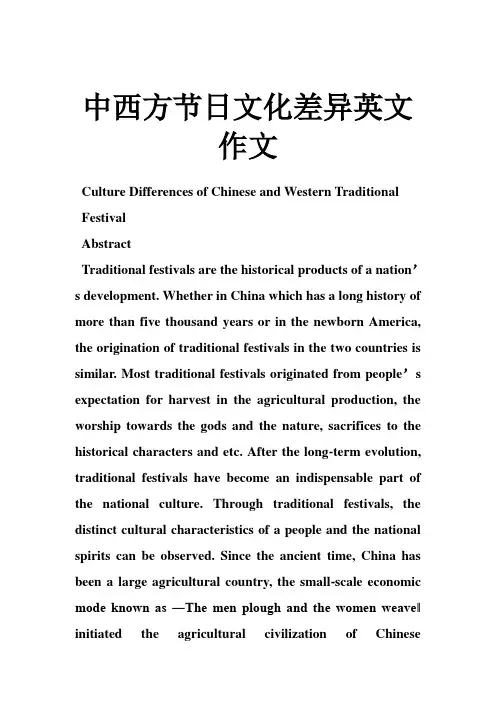
中西方节日文化差异英文作文Culture Differences of Chinese and Western Traditional FestivalAbstractTraditional festivals are the historical products of a nation’s development. Whether in China which has a long history of more than five thousand years or in the newborn America, the origination of traditional festivals in the two countries is similar. Most traditional festivals originated from people’s expectation for harvest in the agricultural production, the worship towards the gods and the nature, sacrifices to the historical characters and etc. After the long-term evolution, traditional festivals have become an indispensable part of the national culture. Through traditional festivals, the distinct cultural characteristics of a people and the national spirits can be observed. Since the ancient time, China has been a large agricultural country, the small-scale economic mode known as ―The men plough and the women weave‖ initiated the agricultural civilization of Chinesecharacteristics. Chinese traditional festivals are deeply rooted in the agricultural civilization and greatly influenced by Confucianism. To some extent, Chinese traditional festivals have relieved from the primitive taboos and tended to be happy festivals which reflect the concept of harmony and integration in Confucianism. In America, religion plays a very important role in people’s life. With various branches, the religious system of America is quite complicated, among which Christianity is of the greatest importance. Some American traditional festivals are the direct products of Christianity and most festivals have evolved into the religious festivals later. This paper is designed to discuss the differences in customs, origins and other aspects of traditional festivals with the similar cultural connotation, then analyze the reasons lying behind the differences and finally reflect the cultural differences of the two nations. The paper also analyzes the mutual fusion in tradtional holidays between China and the west.Key words: Traditional festivals; Chinese and American culture; cultural differences; causes; mutual fusion.中西方传统节日文化的差异摘要传统节日是一个民族发展的历史产物。
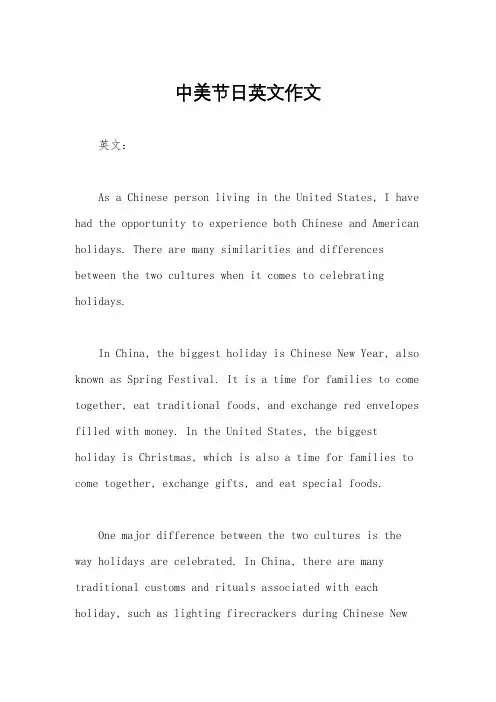
中美节日英文作文英文:As a Chinese person living in the United States, I have had the opportunity to experience both Chinese and American holidays. There are many similarities and differences between the two cultures when it comes to celebrating holidays.In China, the biggest holiday is Chinese New Year, also known as Spring Festival. It is a time for families to come together, eat traditional foods, and exchange red envelopes filled with money. In the United States, the biggest holiday is Christmas, which is also a time for families to come together, exchange gifts, and eat special foods.One major difference between the two cultures is the way holidays are celebrated. In China, there are many traditional customs and rituals associated with each holiday, such as lighting firecrackers during Chinese NewYear. In the United States, holidays are often celebrated with parades, decorations, and special events.Another difference is the way holidays are viewed. In China, holidays are seen as a time to honor tradition and spend time with family. In the United States, holidays are often seen as a time to relax and enjoy time off from work or school.Despite these differences, there are also many similarities between Chinese and American holidays. Both cultures value spending time with family and friends, and both have holidays that involve special foods and traditions. For example, both cultures have holidays that involve giving gifts, such as Chinese New Year and Christmas.Overall, I have enjoyed experiencing both Chinese and American holidays. Each culture has its own unique traditions and customs, but both are centered around spending time with loved ones and celebrating together.中文:作为生活在美国的中国人,我有机会体验到中美两种不同的节日文化。
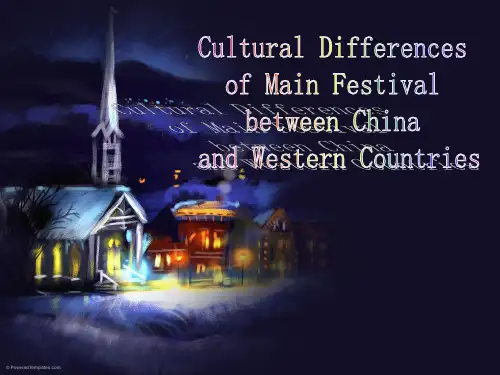
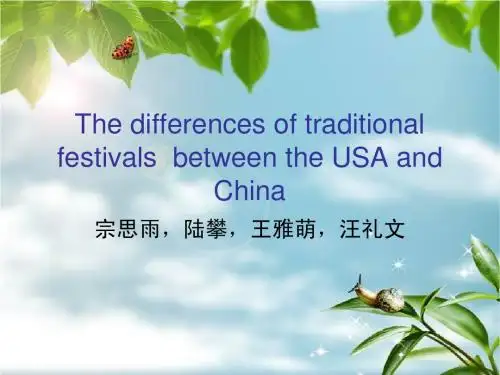
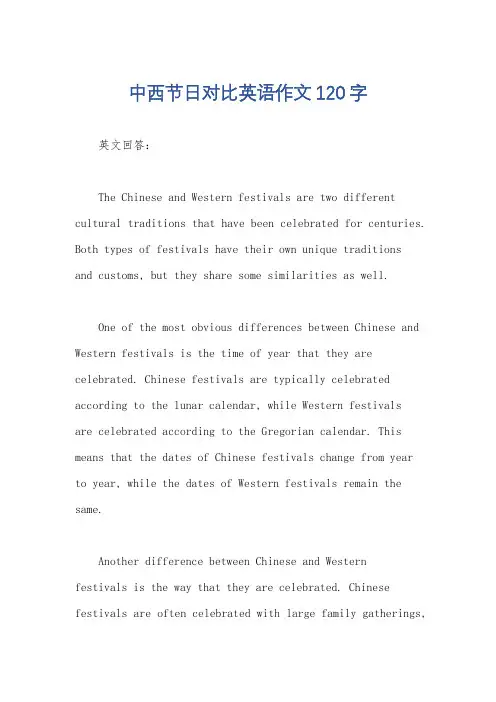
中西节日对比英语作文120字英文回答:The Chinese and Western festivals are two different cultural traditions that have been celebrated for centuries. Both types of festivals have their own unique traditionsand customs, but they share some similarities as well.One of the most obvious differences between Chinese and Western festivals is the time of year that they are celebrated. Chinese festivals are typically celebrated according to the lunar calendar, while Western festivalsare celebrated according to the Gregorian calendar. This means that the dates of Chinese festivals change from yearto year, while the dates of Western festivals remain the same.Another difference between Chinese and Westernfestivals is the way that they are celebrated. Chinese festivals are often celebrated with large family gatherings,feasts, and fireworks. Western festivals, on the other hand, are often celebrated with smaller gatherings of friends and family, and with more emphasis on music and dancing.Despite their differences, Chinese and Westernfestivals share some similarities as well. Both types of festivals are often associated with specific religious or cultural traditions, and both types of festivals are often used as a time to come together and celebrate with family and friends.中文回答:中国和西方节日是两种不同的文化传统,有着数百年的历史。
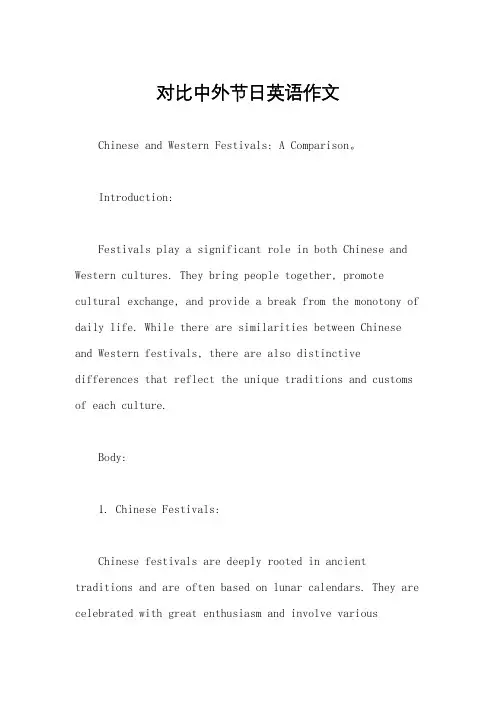
对比中外节日英语作文Chinese and Western Festivals: A Comparison。
Introduction:Festivals play a significant role in both Chinese and Western cultures. They bring people together, promote cultural exchange, and provide a break from the monotony of daily life. While there are similarities between Chinese and Western festivals, there are also distinctive differences that reflect the unique traditions and customs of each culture.Body:1. Chinese Festivals:Chinese festivals are deeply rooted in ancient traditions and are often based on lunar calendars. They are celebrated with great enthusiasm and involve variouscustoms and rituals.a. Spring Festival (Chinese New Year):The Spring Festival is the most important festival in China, marking the beginning of the lunar calendar year. It is a time for family reunions, feasting, and honoring ancestors. Red decorations, firecrackers, and lion dances are common during this festival.b. Mid-Autumn Festival:The Mid-Autumn Festival, also known as the Moon Festival, is celebrated on the 15th day of the eighth lunar month. It is a time for families to gather and appreciate the full moon while enjoying mooncakes, a traditional delicacy. Lanterns are also lit to symbolize good luck.c. Dragon Boat Festival:The Dragon Boat Festival, held on the fifth day of the fifth lunar month, commemorates the ancient poet Qu Yuan.Dragon boat races and eating zongzi, a pyramid-shaped rice dumpling wrapped in bamboo leaves, are the highlights of this festival.2. Western Festivals:Western festivals are often based on the Gregorian calendar and have their roots in religious or historical events. They are celebrated with various customs and traditions.a. Christmas:Christmas, celebrated on December 25th, is a religious festival commemorating the birth of Jesus Christ. It is a time for gift-giving, decorating Christmas trees, attending church services, and enjoying festive meals with family and friends.b. Easter:Easter is a Christian festival that celebrates theresurrection of Jesus Christ. It is observed on the first Sunday after the first full moon following the vernal equinox. Easter eggs, Easter bunnies, and church services are common traditions associated with this festival.c. Halloween:Halloween, celebrated on October 31st, is a festival originating from ancient Celtic traditions. It isassociated with costumes, trick-or-treating, pumpkin carving, and haunted houses. People often dress up as ghosts, witches, or other spooky characters.Comparison:1. Cultural Significance:Chinese festivals often have deep cultural andhistorical significance, reflecting the values and beliefsof the Chinese people. Western festivals, on the other hand, are often rooted in religious or historical events and have evolved over time.2. Traditions and Customs:Chinese festivals are characterized by traditional customs and rituals, such as lion dances, lantern lighting, and family gatherings. Western festivals often involve activities like gift-giving, decorating, and attending religious services.3. Food:Food plays a crucial role in both Chinese and Western festivals. Chinese festivals are associated with specific delicacies like mooncakes and zongzi, while Western festivals often feature traditional dishes like Christmas turkey or Easter ham.Conclusion:While Chinese and Western festivals share the common goal of bringing people together and celebrating important events, they differ in terms of cultural significance,traditions, and food. Understanding and appreciating these differences can foster cultural exchange and promote a deeper understanding of each other's traditions and customs. Festivals serve as a reminder of the rich cultural heritage that both China and the West possess.。

中美节日的差异英语作文英文:In terms of the differences between Chinese and American holidays, there are several key distinctions that stand out to me. First and foremost, the most obvious difference is the timing and significance of the holidays. For example, Chinese New Year, also known as the Spring Festival, is a major holiday in China that marks the beginning of the lunar new year. It is a time for family reunions, feasting, and traditional activities such as dragon dances and setting off firecrackers. In contrast, American holidays such as Thanksgiving and the Fourth of July have their own unique historical and cultural significance. Thanksgiving is a time for families to come together and express gratitude, while the Fourth of July is a celebration of American independence with fireworks and parades.Another difference is the way holidays are celebrated.In China, many holidays are celebrated with traditional customs and rituals that have been passed down for generations. For example, during the Mid-Autumn Festival, families gather to admire the moon and eat mooncakes, while during the Dragon Boat Festival, people eat sticky rice dumplings and participate in dragon boat races. On the other hand, American holidays often involve specific activities such as barbecues and picnics for Memorial Day and Labor Day, or trick-or-treating for Halloween.Furthermore, the role of religion in holidays is a significant difference between the two cultures. Many American holidays have religious origins or significance, such as Christmas and Easter, which are rooted in Christianity. In contrast, while China has its own traditional religions and spiritual beliefs, many of the major holidays are more focused on cultural and historical traditions rather than religious observance.中文:在中美节日的差异方面,我觉得有几个关键的区别。
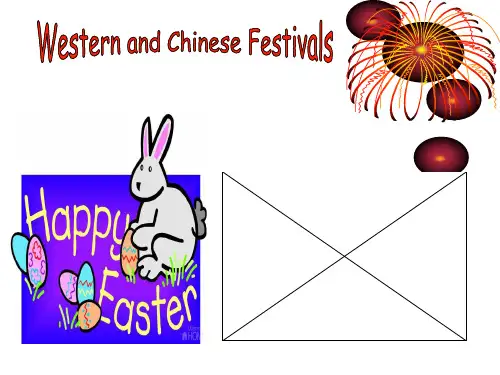
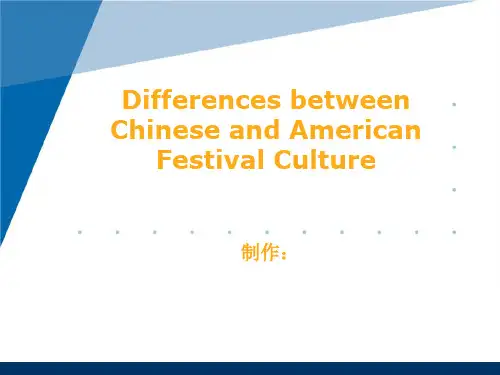
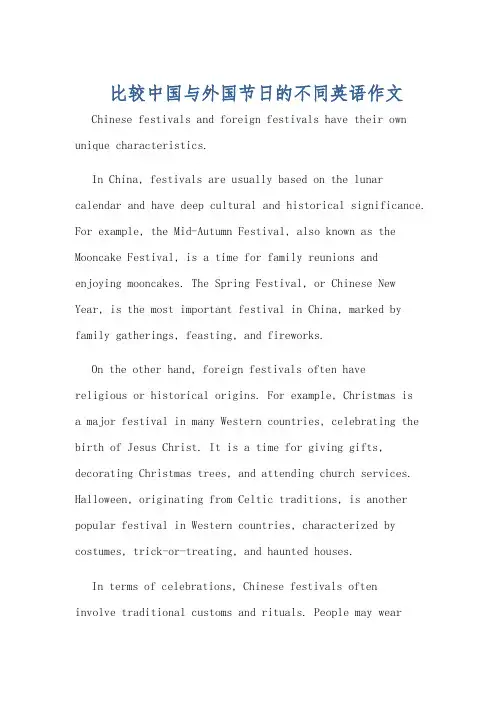
比较中国与外国节日的不同英语作文Chinese festivals and foreign festivals have their own unique characteristics.In China, festivals are usually based on the lunar calendar and have deep cultural and historical significance. For example, the Mid-Autumn Festival, also known as the Mooncake Festival, is a time for family reunions and enjoying mooncakes. The Spring Festival, or Chinese New Year, is the most important festival in China, marked by family gatherings, feasting, and fireworks.On the other hand, foreign festivals often havereligious or historical origins. For example, Christmas isa major festival in many Western countries, celebrating the birth of Jesus Christ. It is a time for giving gifts, decorating Christmas trees, and attending church services. Halloween, originating from Celtic traditions, is another popular festival in Western countries, characterized by costumes, trick-or-treating, and haunted houses.In terms of celebrations, Chinese festivals ofteninvolve traditional customs and rituals. People may weartraditional clothing, make offerings to ancestors, or participate in dragon dances. Foreign festivals, on theother hand, may involve more modern activities such as parades, concerts, and themed events.Food is also an important part of both Chinese andforeign festivals. In China, each festival has its own special dishes and snacks, such as dumplings for the Spring Festival and zongzi for the Dragon Boat Festival. Inforeign countries, traditional festival foods may include roast turkey for Thanksgiving and hot cross buns for Easter.Overall, while Chinese and foreign festivals may differin their origins and customs, they both serve as important occasions for people to come together, celebrate, andcreate lasting memories with loved ones.中国的节日和外国的节日各有其独特的特点。
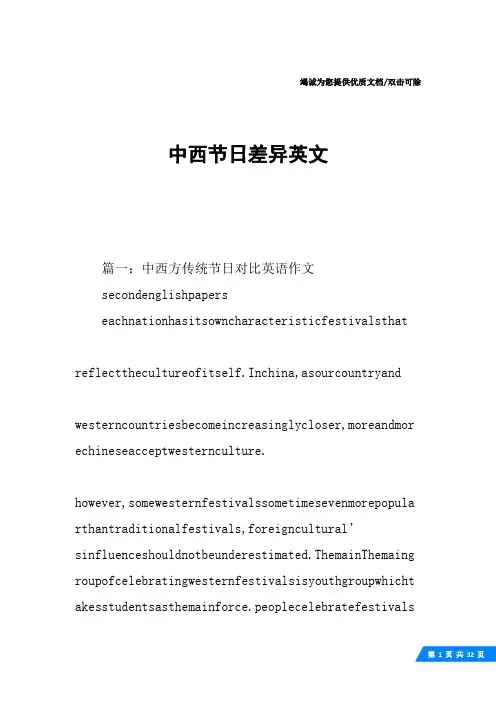
竭诚为您提供优质文档/双击可除中西节日差异英文篇一:中西方传统节日对比英语作文secondenglishpaperseachnationhasitsowncharacteristicfestivalsthatreflectthecultureofitself.Inchina,asourcountryandwesterncountriesbecomeincreasinglycloser,moreandmor echineseacceptwesternculture.however,somewesternfestivalssometimesevenmorepopula rthantraditionalfestivals,foreigncultural’sinfluenceshouldnotbeunderestimated.ThemainThemaing roupofcelebratingwesternfestivalsisyouthgroupwhicht akesstudentsasthemainforce.peoplecelebratefestivalssuchasValentinesday,mothersday,ThanksgivingDayandch ristmasDay.Infact,becauseofthechinesewayofthinking, westernholidaysinchinaisjustpopularforchristmasandV alentinesday,notallwesternholidaysattractpeoplesatt ention.Accordingtoasurveyofcentralchinanormaluniver sity,manycollegestudentsknowtheexistenceofwesternfe stivals,butlittleofthemknowabouttheirculturalconnot ations.Inadditiontochristmas,respondentswhoknowothe rwesternfestivals’meaningarelessthan10%.Referringtothewaytocelebratin g,ingeneral,duringtheFestival,peoplesendgiftssuchas flowersandgreetingcards.Theysingwithfriends,andblessorsendmessagestoeachother;lotsofpeoplearegoing torelaxduringthefestival:shopping,invitingfriendsto restaurants,dancing,andsoon.onthewhole,chineseceleb ratewesternholidayswiththefollowingfaithfourandacharacteristics:passionforuniversality ,particularity,blindconsumptionAsthesayinggoes,1000readershave1000hamletsinmind.pe oplehavedifferentviewsonwhetherchineseshouldcelebra tewesternholidays.somepeoplewhoarekeenonwesternfest ivals,arguedthatchinastraditionalfestivalsaretoorig idandtherearemanyfestivalswithfeudalthinking.onthec ontrary,westernfestivalswhichflamboyantandreflectareexcitingadvocateInthefreedom .addition,westernholidaysmakepeoplewho’reunderheavysocialpressurehaveachancetorelax.Atthes ametime,someexpertsbelievethatthecelebrationofweste rnholidaysareaninevitabletrendofculturalexchanges.h uangKemin,asociologistbelievesthatcelebratingwester nholidaysisaformofculturalcommunication.Insomecases ,it’llfillvacanciesinchineseculture.somestudentsbelieve thatcelebratingwesternfestivalscanenhancethefriends hipofclassmatesandmaketheclassesmoresolidarity.Duri ngafestival,mostofthesupermarketsandrestaurantsprovide promotionsthatbenefitconsumers,thesefestivalsalsohasacatalyticroletoeconomicdevelopment.opponentsbelievethatchinahasitsownhistoryandlocalcu ltureforthousandsofyears,thewesternFestivaldon’tsuitchinasneedsforculturaldevelopment.Also,duetobl indworship,peopleoftenlosttraditionalculture.celebr atingwesternholidayswillshakethetraditionalculture’sstatusinthemindsofnationalsandendangertheinheritan ceanddevelopmentoftraditionalculture.Forexample,man yyoungpeoplecelebrateValentinesday,buttheydontknowc hineseLovers’sDay.Inaddition,owingtotheculturalinvasion,manycoun triesarewaryofforeignholidays.Toguaranteechinesecul tural’sindependence,westernholidayscann’tbeallowedtodevelopfreely.Atthesametime,manypeoplec elebratewesternfestivalsforfollowingthefashion.Thee ffectofculturalexchangesisn’tobvious.Inaddition,theblindpursuitofconsumptionand enjoymentcausesmoneyworship,hedonismandotherbadidea s.Justmypersonalopinion,weshouldcelebratewesternholidayswithrationalthought,andweshouldn’tloseourselves.TowardswesternFestivals,weshouldtakeitses senceanddiscardthedregs.Forinstance,ThanksgivingDay canbeadvocatedformakingourcultureadvanceasitreflect soneofchinesetraditionalvirtues-gratefulness;others ,suchashalloween,shouldbetreatedcalmlybecauseit’sreligious.culturalintegrationisthetrendofthehistoricaldevelopment.soweshouldnotimplement"isolationism".un derthepremiseofenhancingawarenessoftraditionalcultu reandrevitalizingchineseculture,wecanactivelyentert heworldthathasfrequentculturalexchanges.Festivalsareimportantmeansofculturaltransmissionwhi chhosttheimportantcultural.They’rethecrystallizationofhumanwisdom.Richfestivallight supourlives,forourlifehasvariouscolors.Letustakethe broadmindandappreciatethecolorfulfestivals!篇二:中西方节日文化差异比较中英文版oecDsaysunemploymentwillcontinuetoRiseoecD:工业化国家失业率持续攀升Despitereportsthatmanyindustrializedeconomiesarebeg inningtoemergefromtheirworsteconomiccrisisindecades,unemplo ymentisrisingandwilllikelyreachahistoricpeakofnearl y10percentnextyear.Thefindingscomefromtheorganizati onforeconomiccooperationandDevelopmentinparis.经济合作与发展组织星期三报告说,工业化国家的失业率仍在增加,而且有可能在明年达到近10%的历史最高水平,尽管不断有报道说,很多工业化国家正在走出几十年来最严重的经济危机。
中美节日的差异英语作文下载温馨提示:该文档是我店铺精心编制而成,希望大家下载以后,能够帮助大家解决实际的问题。
文档下载后可定制随意修改,请根据实际需要进行相应的调整和使用,谢谢!并且,本店铺为大家提供各种各样类型的实用资料,如教育随笔、日记赏析、句子摘抄、古诗大全、经典美文、话题作文、工作总结、词语解析、文案摘录、其他资料等等,如想了解不同资料格式和写法,敬请关注!Download tips: This document is carefully compiled by theeditor. I hope that after you download them,they can help yousolve practical problems. The document can be customized andmodified after downloading,please adjust and use it according toactual needs, thank you!In addition, our shop provides you with various types ofpractical materials,such as educational essays, diaryappreciation,sentence excerpts,ancient poems,classic articles,topic composition,work summary,word parsing,copyexcerpts,other materials and so on,want to know different data formats andwriting methods,please pay attention!Sure, here's a snippet that captures the essence of the differences between Chinese and American holidays in a conversational tone:1.Imagine stepping into a vibrant tapestry of colors and traditions, where every thread represents a unique celebration. In the heart of China, you'll find the Dragon Dance in the Spring Festival, a fiery spectacle of dragon and lion dances, symbolizing good fortune. In contrast, America's Fourth of July is all about fireworks and the grandeur of Independence Day, where the stars and stripes light up the sky.2.In China, the Mid-Autumn Festival is a moonlit affair, families gather to share mooncakes, a sweet symbol of unity.Meanwhile, Thanksgiving in America is a heartwarming harvest festival, where turkey and pumpkin pie are the main attractions, reflecting gratitude for the harvest and family bonds.3.While Chinese New Year is a time for family reunions and ancestor worship, Christmas in the US is a time for Santa Claus and the magic of Christmas trees. The Christmas carols, with their jingling bells, evoke a sense of joy and anticipation, quite unlike the soft, traditional Chinese carols.4.In China, the Qingming Festival, or Tomb Sweeping Day, is a somber occasion to pay respects to ancestors, while Easter in America is a springtime celebration of resurrection, with Easter eggs and egg hunts, symbolizing new beginnings.5.Lastly, the American Labor Day, a tribute to workers, contrasts with the Dragon Boat Festival in China, where dragon boat races and zongzi (sticky rice dumplings) honor the poet Qu Yuan, reflecting the cultural emphasis on history and tradition.Each holiday, like a snapshot, captures the essence of its respective culture, reflecting the unique blend of history, spirituality, and social values. So, as you explore these differences, remember, they're not just about dates and customs, but about the stories that bind us to our roots.。
中国和西方国家的节日差异英语作文In China, traditional festivals such as the Spring Festival, Tomb Sweeping Day, Dragon Boat Festival, and Mid-Autumn Festival are commonly celebrated. The Spring Festival, also known as Chinese New Year, is the most important and widely celebrated festival in China. Families come together for reunion dinners, exchange red envelopes, and set off fireworks to welcome the new year. During the Tomb Sweeping Day, people pay respects to their ancestors by cleaning their tombs and offering food and paper money. The Dragon Boat Festival is marked by dragon boat races and the eating of sticky rice dumplings. The Mid-Autumn Festival is a time for family gatherings and eating mooncakes while admiring thefull moon.In contrast, Western countries have their own set of traditional festivals, such as Christmas, Easter,Thanksgiving, and Halloween. Christmas is a major holiday in Western countries, characterized by the exchange of gifts, festive decorations, and family gatherings. Easter is a religious holiday that celebrates the resurrection of Jesus Christ, often marked by church services and Easter egg hunts. Thanksgiving is a time for families to come together and give thanks for the blessings of the past year, often accompanied by a large feast. Halloween is a time for dressing up in costumes, trick-or-treating, and decorating homes with spooky themes.One key difference between Chinese and Western festivals is the emphasis on family and tradition. In China, festivals are often a time for families to come together and observe age-old customs and rituals. There is a strong sense of reverence for ancestors and the passing down of cultural heritage. In Western countries, festivals also involve family gatherings, but they are often less focused on traditional customs and more on socializing and entertainment.Another difference is the religious significance of certain festivals. Many Western festivals have religious origins and are still observed with a degree of religious reverence. In contrast, Chinese festivals are often rooted in traditional culture and mythology, with less emphasis on religious practices.Additionally, the way festivals are celebrated also differs between China and Western countries. Chinesefestivals often involve specific activities and customs, such as eating certain foods, performing traditional dances, or participating in ceremonial rituals. Western festivals, on the other hand, often involve more varied forms of celebration, such as gift-giving, feasting, and public events like parades and fireworks.Overall, while there are some similarities in the way festivals are celebrated in both China and Western countries, there are also notable differences in terms of culturalsignificance, religious influence, and the specific customs and traditions associated with each festival. These differences reflect the unique cultural and historical backgrounds of each region, and contribute to the richness and diversity of global festival traditions.。
The comparison between Chinese and Western festivals中西方节日文化的差异比较Abstract: the process of comparing the Chinese and Western festivals and studying Western histories and cultures can help people promote the communication and understanding of different cultures. With the further development of society and inter-cultures, globalization will affect many aspects of life in all countries. And western festivals are becoming more and more popular in China. We should respect them and select the essence. China boasts a brilliant history and splendid traditions. In modern times, Chinese tradition should be preserved and promoted. But it seems that young people no longer treasure the tradition. On the contrary, they turn to pursue enthusiastically a seemingly more modern culture. If this trend is allowed to continue, the priceless heritage of our ancestors will be replaced by western traditions. Nobody expects such a consequence. So let’s join hand in hand to protect and carry forward Chinese tradition.Key words: Traditional festivals; Chinese and Western cultures; difference; globalizationIntroduction:“A holiday of a nation represents a glorious culture and concentrated customs of a nation.” To understand a nation's cultural implications a nd its cultural characteristics, we must start with its traditional festivals. There exists great difference between Chinese and Western festivals due to their different languages, education, life styles and customs. Recently, western festivals are becoming more and more popular among Chinese. On one hand, it can indeed bring some benefits to our country to some extent. On the other hand, we should pay attention to this phenomenon. The differences in their origin and shaping, celebration, food, banquet manners, color of festive dressing and the attitudes of accepting presents contribute to the great differences of Chinese and Western festive cultures. On the background of globalization, we should pay respect to western festivals, and carry forward our excellent traditional festivals at the same time.“A holiday of a nation represents a glorious culture and concentrated customs of a nation.” To understand a nation's cultural implications and its cultural characteristics,we must start with its traditional festivals. There exists great difference between the Chinese and Western festivals due to their different languages, education, life styles and customs.Recently, western festivals are becoming more and more popular among Chinese people, especially among the young. According to an internet survey, more than half of the thirties prefer foreign festivals.With the further development of society and inter-culture, though we should not reject the advanced technology, culture, and foreign language, there is a touch of melancholy when coming to think that our traditional festivals was neglected.There are several possible reasons for this phenomenon. First, western nations, such as the United States and Britain, are powerful and dominant in many aspects. Everything in these countries is assumed to be superior and adored by some modern young people. Second, the prevalence of English as a world language and the development of globalization enable western culture to flood in China. Overwhelmed by such a trend, Chinese unconsciously get involved in western culture. Last but not least, some Chinese people have blind faith in foreign things while dismiss our own possessions with contempt. Undoubtedly, enjoying western festivals can enrich our life, bring us more happiness, promote communication and enhance our friendship. Whether be the foreign festivals or traditional festivals, they all imply the meaning of union, safety and blessing. From the perspective of consumption and entertainment, festivals can not only stimulate domestic demand, but also provide access to exotic cultures. And foreign festival, to some extent, means peer-gathering.Besides, more people should make careful analysis of the differences between Chinese and foreign festival cultures.1. the difference of where they originated and how they took shapeThe original meaning of Chinese traditional festivals is from agriculture, because our country had been in feudal self-sufficient agricultural society and natural economy for a long time. As the old saying goes "Rain in spring is as precious as oil" "The peasants are busy with growing wheat during the Qingming festival". The Spring Festival and Qingming have been important agricultural festivals since ancient times. Western traditional festivals originated from Christianity, such as St. Valentine's Day is in commemoration of Christianity martyr named Valentine, and the Easter of the revival of Jesus, Halloween is All Saints’ Day, and the Christmas is the birth of Jesus.2. the difference in celebrationWestern traditional festivals emphasize on interactivity, collectivity and extreme carnival, focusing on self and advocating free expressing of personality. While in China, we focus on family reunion and enjoy happy family relations. Here we set two examples as follows.*Spring Festival Vs New YearIn western nations, the New Year’s Day falls on January 1st in Gregorian calendar. On the night of December 31, particularly close to the late zero o’clock, tens of thousands of people gather in to pray sincerely and silently for the coming year’s countdown. When the bell sounds 12, suddenly, the beautiful music sound, people are singing happily and talking cheerfully, playing all night long. In China, the Spring Festival falls on January 1st in lunar calendar since Qin Dynasty. On the eve of Spring Festival, we get together to enjoy delicious food and cuisine, staying up for the coming NewYear to bid farewell to the old year. The whole family will spend a beautiful night in the sound of firecrackers. The Spring Festival lasts until Lantern Festival. Spring cleaning, New Year gathering, firecrackers, lion dance are the popular customs during Spring Festival. Each of the two festivals has its strong points: The western New Year embodies fashion trend and modern life. While Chinese people attach great importance to dense national culture and traditional atmosphere to the Spring Festival; it has the glorious history and the unique beauty.* Qingming Festival Vs Halloween DayIn China, April in the lunar year is an important month for ghosts. In this month, the souls will be released from the Hades, and people will be organized to hold activities to entertain them with their hospitality for this rare "holidays". Particularly on April 4th, Qingming festival, every family will prepare for rich offerings to sacrifice these good brothers who come from the nether world. There’re many other activities during the Qingming Festival, such as visiting their ancestors’ tombs, spring hiking and planting osier. Osier means indomitable vitality and can ward off bad luck at the same time. Visiting ancestors’ tombs in Qingming Festival can not only show their respect, what’s more, it shows people’s enthusiasm for life.In the west, the similar festival is called Halloween day(Oct.11-Nov.7th). It is the third important festival next to Christmas and Thanksgiving Day. It is said that people should let the ghost see their satisfactory harvest and present abundant sacrifice to them. Both the bonfires and lights are not only to scare the ghosts away, but also to illuminate them back to the place where they come from. On this day, people can disguise themselves freely and make trouble to their heart’s content. On many public occasions and home compound, people lay out different kinds of decorations on the windows and doors, such as pumpkin lights, a scarecrow and even the skeleton. Every family will hold a dressing ball, and put on fruit and other crops on the table.3. the difference on foodChinese traditional food put emphasis on color, smell and taste. Nearly endless variety of natural ingredients and methods of preparations are employed in Chinese cuisine. The careful coordination of such a series of delicate activities as selecting ingredients, mixing flavors, timing the cooking, controlling the heat and finally laying out the food on the plate for the table are the typical characteristics of Chinese food, especially the festive cuisine. Each Chinese festival is characterized by their distinguished food. People in northern China eat jiaozi on the eve of Spring Festival. The Chinese character "jiao" in "jiaozi" sound like "jiao" which implies union. Besides, jiaozi resembles a gold ingot meaning the gaining of wealth. Throughout southern China, niangao(literally meaning the "year cake", a thick steamed pudding of glutinous rice flour) is made in a great variety of shapes and flavors. The character "gao" in the word "niangao" is homonymous with the word "high", suggesting "growing up and prospering in the new year". We have "yuanxiao" on Lantern Festival, glutinous rice dumplings on Dragon Boat Festival, moon-cake on Mid-autumn Festival. By contrast, the western food tends to be simplified due to their advanced food technology, such as the canned food, fast food, etc. KFC, McDonald is time-saving but lack nutrition.4.the difference of banquet mannersIn China, people will sit around in the festive banquet. We often take round table for the banquet which create friendly and united atmosphere. The food at the center of the table is not only what people eat but also the medium of exchange. People toast to each other, showing respect and courtesy of China. It reflects the influence of "he" in Chinese classic philosophy on off-springs, round table is good for group communication.In western festive banquet, food and drinks just serve as dressing while communication is the core of the banquet. If compared to dance, Chinese banquet is group dancing, western's is social dancing. The purpose of communication on Chinese and western festive banquet is obvious. Chinese festive banquet focus on the communication among all the people presented. While the western banquet emphasizes on personal communication.5. the difference in color of festive dressingThe implications of colors -----The same color symbolizes different meanings in Chinese and western festive cultures.RedRed is a typical color in China. Red lanterns are lit, red couplets and "fu" are put up during festivals. It symbolizes beauty and luck, so red is the first choice of festivals. But in western culture, red is a derogatory term which reminds flood and violence. WhiteWhite is taboo in Chinese festivals which is often used in funerals while in the west, white is a typical festive color. It symbolizes purity and elegance, such as the wedding dress, white candles during the festivals.YellowYellow means dignity in China. In ancient times, only the royal members can be allowed to yellow dress. It has been the color for the ancient China. While in western culture, the color yellow has some negative meanings, it mainly means despicable, timid (for example, yellow dog----despicable people, yellow-livered, yellow streak). 6. the difference in the habit of accepting presentsChinese veil their real thoughts while Westerners always reveal their minds freely and directly. The way of accepting gifts and the attitudes are different. During festivals, the Chinese and the Western countries have shown very different attitudes about a gift for someone. In western country, people often ask for a gift, and they will usually open it in front of people’s face and express their thanks. Chinese people often defer about the present since we are guided by the tradition of modest and courtesy. And we usually do not open it in front of the presenter.In addition, China is a multi-ethnic country. Different lifestyles and customs of different nations contribute to the diversifications and characteristics of Chinese culture. Many minorities have their local festivals, such as the Sporangia Festival of Daizu, Torch Festival of Yizu, etc.Conclusion:In modern times, the prevalence of western festivals in China is the feature of globalization and the mixture of multi-culture. We should pay respect to western festivals, but on the other side, we Chinese should safeguard and protect our own cultural spirit and explore new implication to accomplish the lofty cause of transiting and inheriting our national culture. In fact, what the traditional festivals contain is the traditional culture, which is the national spirit that combines the national confidence and national pride. So the government has the responsibility to strengthen the education to make more people, particularly the young, better know and like our own traditional culture, thus building up national confidence and national pride to carry forward the Chinese excellent traditions.。
中西方文化在庆祝纪念日时的差异英语作文Differences in Celebrating Commemorative Days between Chinese and Western CulturesIntroductionCommemorative days are significant events that uphold tradition and honor historical events, figures, or values. In both Chinese and Western cultures, these days hold immense importance and are celebrated with zeal and enthusiasm. However, there are striking differences in how commemorative days are observed in these two cultures. This essay explores the disparities in celebrating commemorative days between Chinese and Western cultures.1. Cultural SignificanceIn Chinese culture, commemorative days are deeply rooted in ancient traditions and customs. For instance, the Chinese New Year celebration is a time-honored tradition that dates back thousands of years and is marked by elaborate rituals, feasts, and family gatherings. Other commemorative days, such as theMid-Autumn Festival and Dragon Boat Festival, are also celebrated with great pomp and show.On the other hand, in Western cultures, commemorations are often linked to historical events or figures. Days such as Memorial Day and Independence Day in the United States are observed to honor fallen soldiers and commemorate the country's freedom from British rule, respectively. Similarly, Western countries also celebrate religious holidays like Christmas and Easter, which have deep historical and cultural significance.2. Traditional PracticesIn China, traditional practices play a significant role in commemorating special days. For instance, during the Chinese New Year celebrations, people clean their homes, decorate them with red lanterns and couplets, and perform dragon and lion dances to ward off evil spirits. They also visit temples to pray for good luck and prosperity in the coming year.In contrast, Western cultures have their unique traditions for celebrating special days. For example, on Thanksgiving Day in the United States, families gather for a lavish feast that typically includes turkey, stuffing, cranberry sauce, and pumpkin pie. This day is also marked by the tradition of expressing gratitude and thankfulness for the blessings of the past year.3. Festivities and CustomsBoth Chinese and Western cultures have their own customs and festivities to mark commemorative days. In China, people engage in various activities such as lighting fireworks, exchanging red envelopes with money, and watching traditional performances like the dragon dance. They also gather with family and friends to share a meal and exchange gifts.In Western cultures, commemorative days are often celebrated with parades, fireworks displays, and other public events. For example, on the Fourth of July in the United States, cities host patriotic parades, fireworks shows, and concerts to celebrate the country's independence. People also participate in outdoor activities like barbecues and picnics to mark the occasion.4. Symbolism and IconographySymbols and iconography play a significant role in commemorating special days in both Chinese and Western cultures. For instance, the color red is considered auspicious in Chinese culture and is often associated with good fortune and prosperity. Red lanterns, paper-cuttings, and decorative items featuring the Chinese character for "fu" (福) are commonly used during festive occasions.In Western cultures, symbols like the American flag, bald eagle, and Uncle Sam are often used to commemorate special days. For instance, on Veterans Day in the United States, people wear red poppies as a symbol of remembrance for fallen soldiers. Similarly, on Halloween, people dress up in costumes of witches, ghosts, and other spooky characters to celebrate the occasion.ConclusionIn conclusion, the celebration of commemorative days in Chinese and Western cultures reflects the rich diversity and traditions of these societies. While both cultures place a strong emphasis on honoring historical events and figures, they have distinct customs, traditions, and practices that set them apart. By understanding and appreciating these differences, we can gain a deeper insight into the cultural values and beliefs that shape our world.。